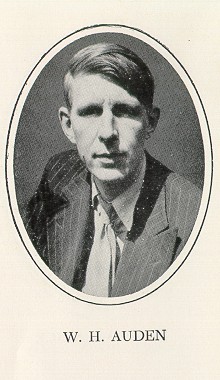16-8-2000
W.H.
Auden
(1907-1973)
|
Stop
all the clocks, cut off the telephone,
Prevent
the dog from barking with a juicy bone,
Silence
the pianos and with muffled drum
Bring
out the coffin, let the mourners come
Let
airplanes circle moaning overhead
Scribbling
on the sky the message She Is Dead
Put
crêpe bows around the white necks of public doves
Let
the traffic policemen wear black cotton gloves
She
was my North, my South, my East and West,
My
working week and my Sunday rest,
My
noon, my midnight, my talk, my song;
I
thought that love would last for ever: I was wrong.
The
stars are not wanted now; put out everyone,
Pack
back the moon and dismantle the sun
Pour
away the ocean and sweep up the wood;
For
nothing can ever come to any good.
|
|
|
An unknown citizen
(To JS/07/M/378 This
Marble Monument Is Erected by the State)
He
was found by the Bureau of Statistics to be
One against
whom there was no official complaint,
And all the
reports on his conduct agree
That, in the
modern sense of an old-fashioned word, he was a saint,
For in
everything he did he served the Greater Community.
Except for the
War till the day he retired
He worked in a
factory and never got fired,
But satisfied
his employers, Fudge Motors Inc.
Yet he wasn't a
scab or odd in his views,
For his Union
reports that he paid his dues,
(Our report on
his Union shows it was sound)
And our Social
Psychology workers found
That he was
popular with his mates and liked a drink.
The Press are
convinced that he bought a paper every day
And that his
reactions to advertisements were normal in every way.
Policies taken
out in his name proved that he was fully insured,
And his
Health-card shows he was once in hospital but left it cured.
Both Producers
Research and High-Grade Living declare
He was fully
sensible to the advantages of the Installment Plan
And had
everything necessary to the Modern Man,
A phonograph, a
radio, a car and a frigidaire.
Our researchers
into Public Opinion are content
That he held
the proper opinions for the time of year;
When there was
peace, he was for peace; when there was war, he went.
He was married
and added five children to the population
Which our
Eugenist says was the right number for a parent of his generation,
And our
teachers report that he never interfered with their education.
Was he free?
Was he happy? The question is absurd:
Had anything
been wrong, we should certainly have heard.
O cidadão desconhecido
(A JS/07/M/378 o Estado ergueu
este Monumento de Mármore)
Segundo
apurou o Instituto de Estatística,
Contra
ele nunca existiu qualquer queixa oficial,
E
todos os relatórios sobre a sua conduta confirmam:
No
moderno sentido de uma palavra velha, ele era um santo,
Pois
em tudo o que fez serviu a Grande Comunidade.
Com
excepção da Guerra e até ao dia da reforma,
Trabalhou
numa fábrica e nunca foi despedido;
Sempre
satisfez os patrões, Máquinas Fraude, L.da.
Mas
não era fura-greves nem tinha opiniões estranhas,
Pois
o Sindicato informa que sempre pagou as quotas
(E
o seu Sindicato tem a nossa confiança)
E
o nosso pessoal de Psicologia Social descobriu
Que
ele era popular entre os colegas e gostava de um copo.
A
Imprensa não duvida de que comprava um jornal por dia
E
que as reacções à publicidade eram cem por cento normais.
Apólices
tiradas em seu nome provam que tinha todos os seguros,
E
o Boletim de Saúde mostra que esteve uma vez no hospital e saiu curado.
Tanto
o Gabinete de Estudo dos Produtores como o da Qualidade de Vida declaram
Que
estava plenamente sensibilizado para as vantagens da Compra a Prestações
E
tinha tudo o que é preciso ao Homem Moderno:
Um
gira-discos, um rádio, um carro e um frigorífico.
Os
nossos inquiridores da Opinião Pública alegram-se
Por
ter as opiniões certas para a época do ano;
Quando
havia paz, era pela paz, quando havia guerra, ele ia,
Era
casado e aumentou com cinco filhos a população,
O
que, diz o nosso Eugenista, era o número certo para um pai da sua geração,
E
os nossos professores informam que nunca interferiu com a sua educação.
Era
livre? Era feliz? A pergunta é absurda:
Se
algo estivesse errado, com certeza teríamos sabido.
Tradução
de João Ferreira Duarte, em "LEITURAS, poemas do inglês", Relógio de Água, 1993.
ISBN 972-708-204-1
The
long poem Letter to Lord Byron,
here
 W.H. Auden
W.H. Auden

Grappling with God
The faith of a famous poet.
by Wilfred M. McClay
05/15/2006, Volume 011, Issue 33
Auden and Christianity
by Arthur Kirsch
Yale, 240 pp., $30
Read this
article
here


